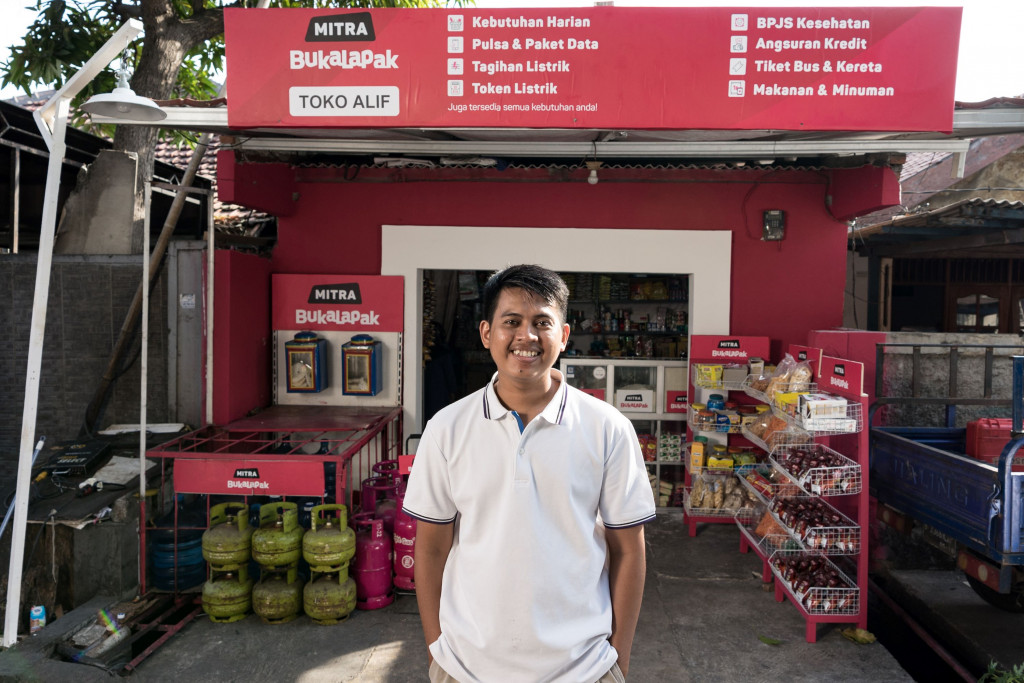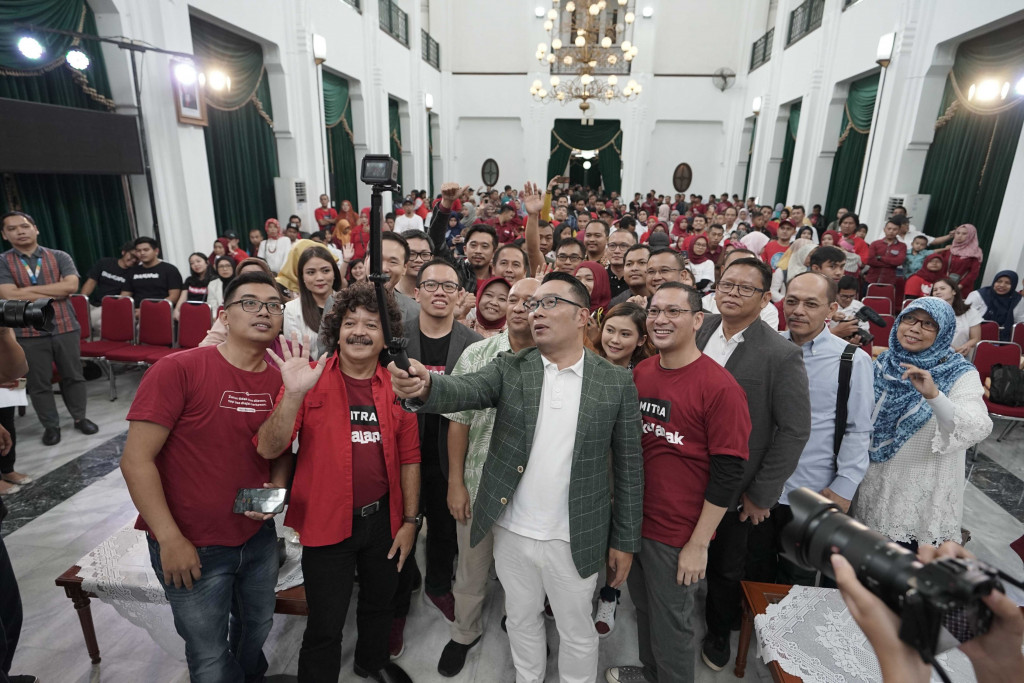Seeing the Close Relationship of Bukalapak, Warung, and West Java
Be the focus of Bukalapak's business for the next five years; it is claimed that the business contribution of Bukalapak Partners has doubled
The wheels of the Indonesian economy are fronted by 99,97% of SMEs with a contribution of more than 60% to the country's economy. Owners of traditional stalls are included in one of its components, because they have an important role as the pulse of the economy in everyday life.
According to data Eurominitors International 2018, the majority of Indonesians, Indians and Filipinos shop at grocery stores. Of the total retail market value of $521 billion, as much as $479,3 billion or 92% of which were grocery store transactions.
Behind the great potential, this lower class economy holds a big challenge, how the presence of technology can help them to "grade up" through go digital. The issue that needs to be answered is not only how they can more easily market their products through digital platforms.
Other aspects that need to be resolved, ranging from payment systems, logistics, to supply chains that must be efficient. This awareness has finally been tried to be answered by various digital startups, both of which have status unicorn as well as those still in startup status.
The solutions offered are very diverse and can represent what has been an issue so far for shop owners. Bukalapak can be an example of how the initial project specifically for the empowerment of traditional stalls "Mitra Bukalapak" can be a serious business to a real money maker.
As a prologue, in 2016 Bukalapak created an initiative called Bukalapak Credit skipper which was the forerunner of the Bukalapak Partner. The services offered are the sale of virtual products such as telephone credit, data packages, game vouchers and prepaid electricity tokens.
From there it developed into a Bukalapak Agent to create an O2O business after receiving positive enthusiasm from the community. The following year, agents were showered with additional services so that they could sell more, such as transportation tickets and Wholesale Agent Bukalapak to create trade distribution channels.
In the following year, choose to rebranding become a Bukalapak Partner and at the same time release the application. Additional features continued in 2019, with the release of gold investment features, the use of QRIS for payment methods and collaboration with Google My Business to make it easier to find stalls through Google Maps.
"The contribution has been quite good although I can't say exactly. But it's been double digit percentages of the total business contribution in Bukalapak. In the early days, it was still below 10%, now [Bakkael Partners] has become a promising business," said Bukalapak Co-Founder & President M. Fajrin Rasyid when met DailySocial in Bandung, last week (8/3).
Now it is said that Bukalapak partners have more than 3,3 million partners, consisting of 1,5 million warung partners spread over 189 regions and the rest are in the form of individual agents. Interestingly, about 30% or the equivalent of 500 thousand partners are in West Java Province.
Map of competition as a new business
At the same time, Bukalapak announced the addition of new features embedded for Bukalapak Partners. Among these features are Send Money (with Bank Mandiri), Gold Savings (with Pegadaian), E-Samsat and Samolnas (National Online Samsat) payments, Telkom/Indihome bills, and game vouchers.
For the time being, this samsat payment is only available for consumers and Bukalapak partners who are domiciled in West Java. It was stated that e-samsat payments channeled through Mitra Bukalapak reached Rp. 30 billion to pay taxes on 40 thousand vehicles.
With Send Money, people can take advantage of the existence of 1,5 million Bukalapak Mitra stalls as ATMs to send money without having to have an account. Meanwhile, for Gold Savings, the public can invest in gold from the price of Rp. 10 thousand at the shop.
Fajrin said the company will expand to other provinces so that everyone can have convenience. All of these latest features are developments from the needs of partners in the field. Also the result of internal collaboration with partners.
"Online Samsat payments are already in the application [consumers] have collaborated with many provinces. We will soon add [other provinces] to the Mitra Bukalapak application."
According to Fajrin, the inspiration for the next feature that will be brought to Mitra Bukalapak will come from consumer applications. Because basically, all of these features are possible to provide. Obstacles still exist, he continued, although they are limited to technical matters.
For example, Bukalapak has a mutual fund investment feature called BukaReksa. Buying mutual funds for the first time requires a KYC process which is technically more complicated. Unlike the case with the purchase of gold savings which is somewhat simpler.
"We are trying to make all the features in the Bukalapak application available in the Mitra application, so hopefully there will be additional [features] in the future."
Bukalapak's incessant effort is to create an inclusive society that doesn't only happen in big cities, but also in 3T (frontier, outermost, and underdeveloped). This can be done through stalls as one of the ways, through Bukalapak Partners.
This product will be the focus of the company for the next five years because it is considered a key driving platform that can increase digital adoption and financial inclusion. According to the report "E-warung: Indonesia's New Digital Battleground" released by CSLA in 2019 shows that there are around 6 million traditional warungs in Indonesia.
Fajrin said, Mitra Bukalapak's achievements to date have made the company quite proud because in terms of quantity and features it can be said to be superior to other players.
"Initially we moved online and we realized that offline SMEs also need to be empowered. Maybe we are a company that is engaged in both seriously and [the scale is] large, this can be a key differentiation that other companies may not have encountered. online, but offlineit doesn't really matter, or vice versa."
Similar products created by Tokopedia, named Mitra Tokopedia, as of the end of last year, it had captured around 400 thousand micro-entrepreneurs, both owners of stalls, grocery stores, and other similar businesses. Since its release in November 2018, partners can sell digital products such as PPOB to buy stock items.
Shopee also doesn't want to lose. Since the application was released on the Play Store in September 2019, the features are not much different. Until now, Shopee has not been willing to officially release this product to the public.
According to CSLA, the B2B model that the players took marketplace This has the opportunity to push the company's earnings before interest, taxes, depreciation and amortization (EBITDA) in a positive direction.
From other business verticals, this realm is also enlivened by other players such as GrabKiosk by Kudo, Warung Pintar, Wahyoo, Payfazz, Netzme and many more. The concepts offered intersect with issues that have been faced by traditional agents and stalls.
Payfazz, for example, positions itself as a financial agent in the village. Temporary, Wahyoo positioning itself as the shaper of the food stall ecosystem by providing easy stock of goods.
In joint interview DailySocial, Co-Founder & CEO of PayFazz Hendra Kwik claimed that the business model adopted by the company, namely B2B2C, is considered capable of making a positive business contribution. He even said that the company had made a profit but it was not positive.
“This year should be positive if for example hiring stops, but we continue to invest there, speltit's big," he said.
Payfazz's biggest contributor comes from selling PPOB products because the payment services provided are quite comprehensive. In addition to being sold by its agents, PPOB is also distributed by API (host-to-host/H2H) through its subsidiary Billfazz. Through Billfazz, the API from PPOB Payfazz can be used by company partners who want to sell PPOB.
West Java's special relationship with Bukalapak
Historically and geographically, West Java has a special relationship with Bukalapak. No wonder it is mentioned that there are more than 500 thousand partners in this province out of a total of 3,3 million throughout Indonesia.
Bukalapak CEO Rachmat Kaimuddin explained that Bandung being chosen to host the launch was also part of the company's initiative this year to roadshow to other regions to identify potential local SMEs that can be collaborated with various stakeholders.
"Entering its second decade, Bukalapak is focused on optimizing the potential of SMEs in each region of Indonesia. Warung as a place for people to do economic activities has great potential to become a regional economic strength and encourage national growth," explained Rachmat.
More Coverage:
West Java Governor Ridwan Kamil, who was also present at the inauguration ceremony, said that the use of technology in food stalls could become the basis of regional economic strength. According to him, the more stalls that sell virtual products, the more profitable it will be for shop owners and the surrounding community, which in turn will improve the regional economy.
In this province, he continued, 80% of the economy is supported by the SME sector with the largest portion being in the culinary sector. It is also claimed, digital penetration has reached the same number. This condition makes the Provincial Government optimistic that in the next three to five years all types of trade can be carried out digitally.
"These three bases have been go digital. I am sure that in three to five years all types of trade in West Java, whether large or small and real like warungs, can use digital platforms," said Kang Emil, Ridwan Kamil's nickname.
He said that to realize this ambition, the Provincial Government is promoting the development of a digital-based economy for MSMEs, warungs, and Islamic boarding schools with the Pentahelix collaboration model.
This concept introduces that the power of development in a country or region needs to be supported by all elements, not just one party. The five elements, starting from the government, society or community, academia, entrepreneurs and the media.
Support Kang Emil's statement, according to the results 2020 EV-DCI report explained that West Java has an index score of 55.0 (scale of 100) in second place, after Jakarta based on scores related to digital competitiveness readiness.
Supporting factors include human resources supported by the highest number of study programs and lecturers in the digital field in Indonesia. As a result, the number of workers in the ICT sector is quite high. Digital infrastructure is adequate and is in the third position, after DKI Jakarta and Bali.
However, this report also focuses on the relatively low contribution of ICT to GRDP (Gross Regional Domestic Product). This is because computer ownership is still low, ranking in the third lowest rank among other provinces on the island of Java.
Internet access via laptop in the lowest province on the island of Java and the bottom three at the national level. Financial facilities such as ATMs are not evenly distributed because the economy in this province is concentrated in only a few cities. In other words, West Java still has a great opportunity to continue to grow because the ICT sector GRDP growth rate is the highest in Indonesia.
Sign up for our
newsletter


